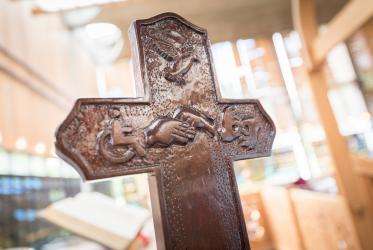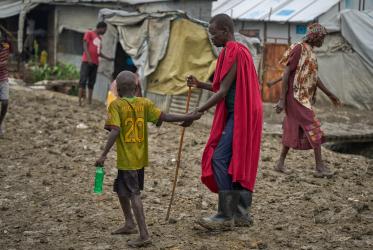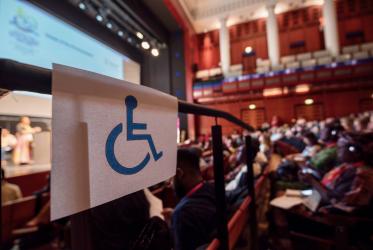Over one hundred faith-based organizations from Christian, Jewish, Muslim and Buddhist traditions gathered at the 15th International AIDS Conference in Bangkok to make their voices heard on issues related to HIV/AIDS.
As UNAIDS director Peter Piot challenged religious leaders to play an “expanded role” in addressing the HIV/AIDS pandemic and social factors that contribute to its growth, delegates from the various organizations discussed ways to facilitate a common, faith-based response.
An ecumenical media team provided stories on these discussions from the differing perspectives of those involved.
Breakthrough in Bangkok
Everywhere you turned in the 15th International AIDS Conference, there they were: Catholic nuns and Buddhist monks, church leaders and faith-based community organizers from all over the globe. Bangkok will be remembered as the place where people of faith were welcomed to the international discussion of HIV and AIDS.
media.e-alliance.ch/iac2004/docs/pr_8_en.doc
Use of condoms debated in faith communities
At this year’s Carnival, the Brazilian government distributed 10 million free condoms - a record figure. But Brazil has the world’s largest Catholic population and the action prompted an angry reaction from the Catholic Bishops’ Conference. Faith leaders are divided on condom use.
media.e-alliance.ch/iac2004/docs/fa_11_en.doc
"I will have long holidays when I die"
Would you recommend the use of the condom in the case of a couple in which one of the partners is HIV positive? “Not recommending it would be a mortal sin!” sister Mercedes Karuna Placino responds, teasingly, and then laughs. Smiling come easily to the eyes and lips of thid sister from the Daughters of Charity of Saint Vincent of Paul, one of 28 Roman Catholic organizations implementing programs to combat AIDS in Thailand.
media.e-alliance.ch/iac2004/docs/fa_15_en.doc
"God will find the solution": Faith helps Namibians cope with AIDS
Namibia is a country devastated, not by civil war or ethnic and religious conflicts, but by an increasing mortality linked to AIDS. In a country where 80 percent of the population is Christian - the largest percentage in Africa - and the rest of the population follows traditional religions, religious beliefs have become a key factor for Namibians to cope with the epidemic.
media.e-alliance.ch/iac2004/docs/fa_17_en.doc
Churches support code of good practice
Representatives of organizations working on HIV and AIDS met during the 15th International AIDS Conference in Bangkok to discuss a draft code of good practice for NGOs responding to the epidemic. Members of the project’s Steering Committee, which includes the World Council of Churches (WCC), shared the purpose and process of the code.
media.e-alliance.ch/iac2004/docs/pr_10_en.doc
More articles, including news in French, German and Spanish, as well as pictures and video highlights are available on the conference website at:
Additional information: [email protected]
The Ecumenical Advocacy Alliance, Norwegian Church Aid, the World Conference of Religions for Peace, and Catholic Relief Services have played critical leadership roles in faith-based planning for this conference, but many more organizations have contributed and supported the efforts through advisory committees and as participants.
The Ecumenical Advocacy Alliance is a broad international network of over 85 churches and church-related organizations cooperating in advocacy on global trade and HIV and AIDS. Among the participants are the World Council of Churches, The Lutheran World Federation, the YMCA and YWCA, Franciscans International, the All Africa Conference of Churches and the Presbyterian Church of Korea. The Alliance is based in Geneva, Switzerland. For more information, seewww.e-alliance.ch






